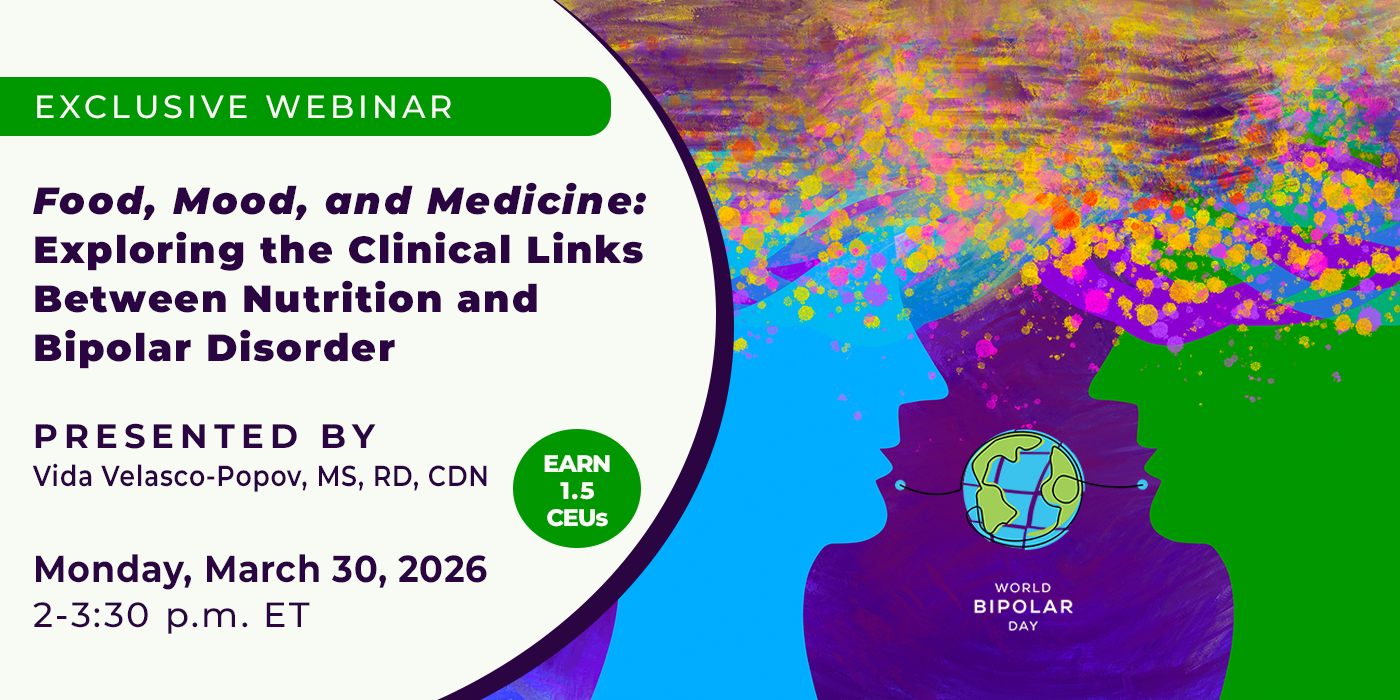Webinar: Food, Mood, and Medicine: Exploring the Clinical Links Between Nutrition and Bipolar Disorder
 Bipolar disorder (BD) affects 2.8% of Americans, yet nutrition as a supportive co-therapy remains largely overlooked in comprehensive treatment plans.1 Individuals living with BD face alarming health disparities, including elevated rates of suicide, substance abuse, obesity, and type 2 diabetes, with a 32.7% global prevalence of metabolic syndrome in this population.2-4 The national economic burden of this condition exceeds $195 billion annually, with direct medical costs accounting for 25% of this total—underscoring the urgent need for innovative, cost-effective health care interventions.5
Bipolar disorder (BD) affects 2.8% of Americans, yet nutrition as a supportive co-therapy remains largely overlooked in comprehensive treatment plans.1 Individuals living with BD face alarming health disparities, including elevated rates of suicide, substance abuse, obesity, and type 2 diabetes, with a 32.7% global prevalence of metabolic syndrome in this population.2-4 The national economic burden of this condition exceeds $195 billion annually, with direct medical costs accounting for 25% of this total—underscoring the urgent need for innovative, cost-effective health care interventions.5
Together we will explore the critical intersection of nutrition and bipolar disorder care. Health care professionals will gain valuable insights into inflammatory processes impacting BD and discover how targeted nutrition interventions can support traditional treatment approaches. This presentation will examine specific micronutrient imbalances affecting patients with BD, explore dietary patterns and their clinical implications, and provide practical guidance for implementing nutrition-focused care strategies.
Join Vida Velasco-Popov, MS, RD, CDN, on Monday, March 30, 2026, from 2-3:30 p.m. ET, - World Bipolar Day - for a comprehensive webinar that will explore how an interprofessional approach can integrate current evidence-based nutrition research into clinical practice to support holistic management of bipolar disorder. Discussion will highlight the connections among nutrition, mood, and social and environmental factors, emphasizing coordinated, nutrition-focused interventions to improve patient outcomes and quality of life.
Learning Objectives
After completing this continuing education activity, health care professionals will better be able to:
- Understand the relevance of nutrition in bipolar disorder care by examining key metabolic mechanisms and how they guide evidence-based nutrition recommendations.
- Identify unique considerations, barriers to care, and challenges when working with patients who struggle with bipolar disorder.
- Implement practical approaches when supporting patients through nutrition interventions and interdisciplinary team collaboration.
- Review the current state of research on nutrition and bipolar disorder, including emerging evidence and future research priorities.
1. National Institute of Mental Health. Bipolar disorder. www.nimh.nih.gov. Published 2022. https://www.nimh.nih.gov/health/statistics/bipolar-disorder
2. Rowland T, Marwaha S. Epidemiology and risk factors for bipolar disorder. Therapeutic Advances in Psychopharmacology. 2018;8(9):251-269. doi:https://doi.org/10.1177/2045125318769235
3. Liu YK, Ling S, Lui LMW, et al. Prevalence of type 2 diabetes mellitus, impaired fasting glucose, general obesity, and abdominal obesity in patients with bipolar disorder: A systematic review and meta-analysis. Journal of Affective Disorders. 2022;300:449-461. doi:https://doi.org/10.1016/j.jad.2021.12.110
4. Salari N, Asgharpour M, Daneshkhah A, et al. Global prevalence of metabolic syndrome among individuals with bipolar disorder: A systematic review and meta-analysis. Archives of Psychiatric Nursing. 2025;58:151942. doi:https://doi.org/10.1016/j.apnu.2025.151942
5. Bessonova L, Ogden K, Doane MJ, O’Sullivan AK, Tohen M. The Economic Burden of Bipolar Disorder in the United States: A Systematic Literature Review. ClinicoEconomics and Outcomes Research. 2020;Volume 12:481-497. doi:https://doi.org/10.2147/ceor.s259338
Additional Information

 Vida Velasco-Popov, MS, RD, CDN, is a clinical dietitian with a deep passion for advancing nutrition research and empowering individuals to achieve optimal health through food. Her journey into nutritional psychiatry stemmed from witnessing loved ones who faced severe mental health challenges, driving her to explore the role food might play in healing and recovery. These experiences inspired her to delve into the research and contribute to the evolving field of nutrition and mental health.
Vida Velasco-Popov, MS, RD, CDN, is a clinical dietitian with a deep passion for advancing nutrition research and empowering individuals to achieve optimal health through food. Her journey into nutritional psychiatry stemmed from witnessing loved ones who faced severe mental health challenges, driving her to explore the role food might play in healing and recovery. These experiences inspired her to delve into the research and contribute to the evolving field of nutrition and mental health.
As a published researcher, Vida authored "The Role of Food and Nutrition in Treating Bipolar Disorder: A Narrative Review for The Allied Health Professions" in Medical Research Archives. Her work was featured in Today's Dietitian Magazine's 2025 spring issue on nutritional psychiatry and bipolar disorder. Vida holds a Bachelor of Science in Biological Sciences from UCLA and a Master of Science in Nutrition and Dietetics from Pace University. She has gained extensive clinical and community experience through her work at El Camino Hospital, New York Presbyterian Hospital, Westchester Medical Center, Open Door Family Medical Center, St. Barnabas Hospital (SBH) Teaching Kitchen, and Nourish, a telehealth technology that connects patients with RDs. Vida is dedicated to advancing nutrition care by advocating for a more comprehensive approach to bipolar disorder treatment and bridging evidence-based nutrition research with conventional care practices.
Disclosures:
The faculty and planners for this educational activity have no relevant financial relationship(s) with ineligible companies to disclose.
An “ineligible company” includes any entity whose primary business is producing, marketing, selling, re-selling, or distributing health care products used by or on patients.
 In support of improving patient care, Great Valley Publishing Company is jointly accredited by the Accreditation Council for Continuing Medical Education (ACCME), the Accreditation Council for Pharmacy Education (ACPE), and the American Nurses Credentialing Center (ANCC), to provide continuing education for the healthcare team. This activity will also award credit for dietetics (CDR CPEU).
In support of improving patient care, Great Valley Publishing Company is jointly accredited by the Accreditation Council for Continuing Medical Education (ACCME), the Accreditation Council for Pharmacy Education (ACPE), and the American Nurses Credentialing Center (ANCC), to provide continuing education for the healthcare team. This activity will also award credit for dietetics (CDR CPEU).
This activity will also award credit for dietetics (CDR CPEU).
Dietitians:
This activity will also award 1.5 CDR CPEU credits for dietetics. Completion of this RD/DTR profession specific or IPCE activity awards CPEUs (One IPCE credit = One CPEU). If the activity is dietetics-related but not targeted to RDs or DTRs, CPEUs may be claimed which are commensurate with participation in contact hours (One 60-minute hour = 1 CPEU).
RDs and DTRs are to select activity type 102 in their Activity Log. Sphere and Competency selection is at the learner's discretion.
Physicians:
Great Valley Publishing designates this live material for a maximum of 1.5 AMA PRA Category 1 Credit (s)™. Physicians should claim only the credit commensurate with the extent of their participation in the activity.
Interprofessional:
This activity was planned by and for the healthcare team, and learners will receive 1.5 IPCE credits for learning and change.
Available Credit
- 1.50 Interprofessional Continuing Education (IPCE)This activity was planned by and for the healthcare team, and learners will receive Interprofessional Continuing Education (IPCE) credits for learning and change.
Price
Required Hardware/software
Ensure your browser's cookies are enabled in order for the webinar software to function properly.

 Facebook
Facebook X
X LinkedIn
LinkedIn Forward
Forward